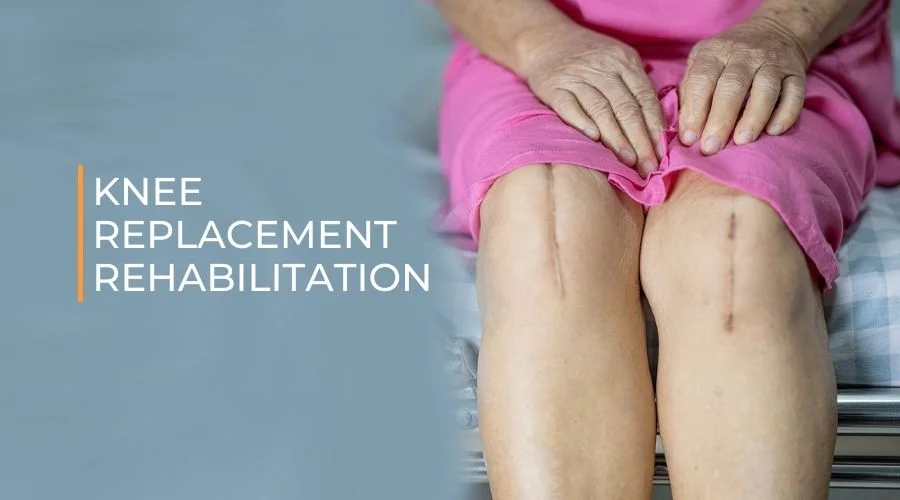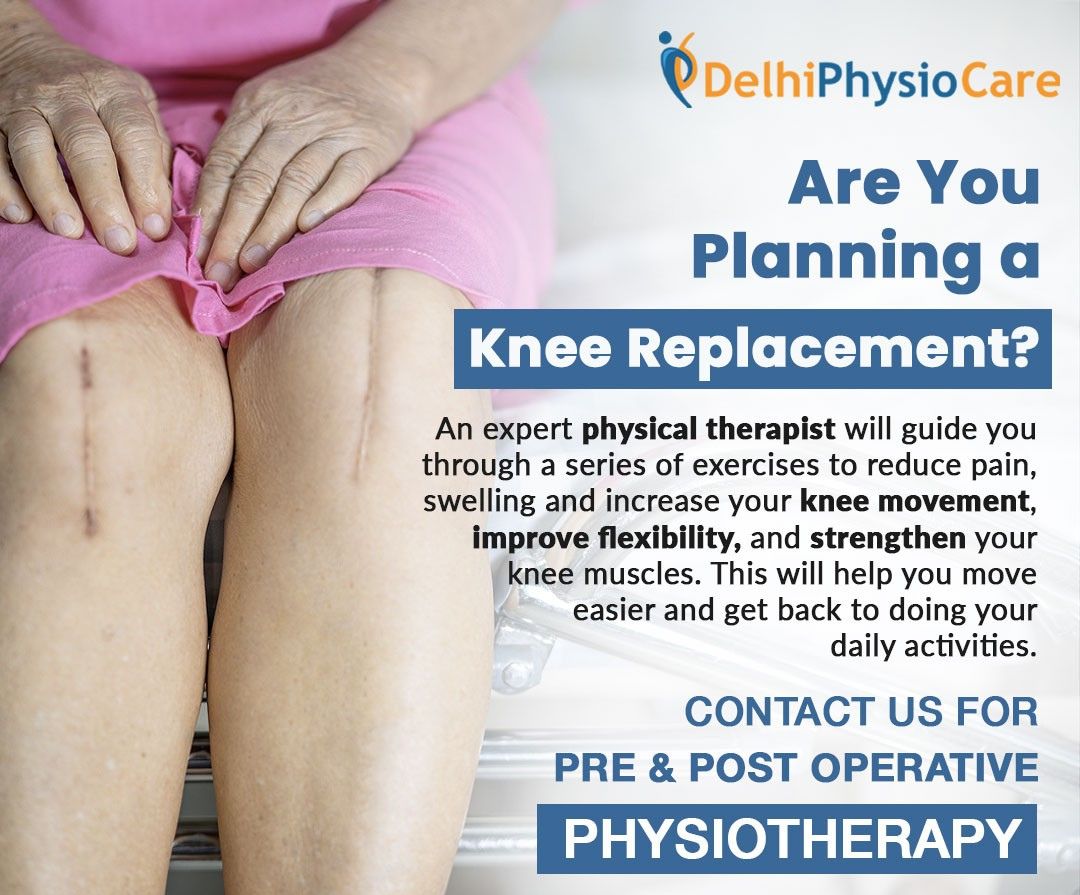Knee Replacement Rehabilitation
Home / Knee Replacement RehabilitationKnee Replacement Rehabilitation Delhi

“Total Knee Replacement” refers to a surgery that eliminates the aggregate of a ligament or harmed knee joint. Following the removal of the damaged part, the joint is supplanted with a metal, plastic, or ceramic part (called a prosthesis) that assists patients with keeping up with a few or the entirety of the portability they would have in a solid joint.
The knee is the most usually supplanted joint in the body. Normally, a total knee replacement procedure is performed when individuals have:
- Knee joint harm because of osteoarthritis, rheumatoid joint inflammation, other bone illnesses, or crack that has not responded to more moderate treatment choices
- Knee pain or ligament issues in the leg that cause trouble with strolling or performing everyday exercises, which have not responded to more traditional treatment alternatives
At Delhi Physio Care, we’ll help with a rehabilitation plan that is designed solely for you. We will make recovery from knee replacement surgery as simple as possible to improve your mobility and quality of life. Our definitive objective after the knee replacement procedure is to restore your freedom.

Our objective of the initial two weeks of recuperation is to reduce the pain and swelling, mend the Incision, reestablish the normal movement, and start work out. Following those fourteen days, our team will tailor your scope of works out, progressive muscle-reinforcing workout, body and balance training, functional training, and activities explicit to address your particular objectives and get you back to the normal routine.
Physiotherapy Management of Knee Replacement Surgery
Physiotherapy helps in knee arthritis. It helps in relieving pain, improving the joint range of movement and the muscle strength. But in severe arthritis or joint damage when the patient has tried everything including physiotherapy, injections and painkillers and nothing seems to work, then it is time to consider a knee replacement surgery also called knee arthroplasty.
A successful surgery without any complications during and post-op is half job done. The rest of the work will involve a good physio rehab that will work on several fronts like;
- Pain
- Joint range of movement (mainly knee bending and straightening)
- Swelling
- Redness
- Muscle weakness
- Balance and proprioception
- Gait training
- Stair climbing
- Scar mobility
Ideally physiotherapy should start while the patient is in pre-op. He is more alert, can take commands better and practice the exercises as soon as he gets conscious post surgery.
Very simple exercises are taught at this stage. These are mainly;
- Ankle movements
- Deep breathing exercises
- Isometric quadriceps exercise
- Isometric glutes (squeezing buttocks)
- Knee bending with heel drag
Starting these exercises immediately post-op is necessary as it improves circulation, reduces pain and prevent blood clots.
Your physiotherapist will visit you the same day and start the cold compressions. Along with your exercises that are mentioned above your therapist will teach you how to shift in bed, get you to sit up on the side of the bed and if possible make you stand the same day. CPM(continuous passive movement) machine are recommended for a few days.
Day 2 is a follow up of same exercises. Progressing to straight leg raises and making the patient walk, take a few steps. Make him sit in a chair with leg extended for sometime.
The discharge from the hospital is usually on 5-7 day post op. By the time the patient is discharged he would have a set of exercises focusing on his joint range of movement and muscle strengthening esp. the quadriceps. Along with the knee the focus should also be on ankle and hip joint of the affected side.
Your physiotherapy regime will continue from anywhere between 8- 12 weeks, depending on your progress. It is recommended that you exercise at least for 30minutes twice a day. The exercises are gradually progressed in terms of strength and range. You need to exercise for 1year. You can stay on maintenance therapy with the therapist visiting him once or twice a week and rest of the days self exercising at home.
Your exercises will be aimed to get your knee flexion range at minimum 110degree with complete extension. For a non restricted comfortable walking we need 65degree flexion of knee, stair climbing 85degrees and for sitting and standing about 100degrees. Complete extension of the knee is a sign of strong quadriceps muscle. Your initial walking for a couple of days will be with the help of a walker, that will gradually progress to a cane and then without any aid. The focus is on the heel-toe pattern, equal weight bearing and do not lean while walking.
Similarly the stairs are started with a railing support, one step at a time. Going up is always with the non operated leg first and coming down with the operated leg.
Pain management is done by NSAID, cold packs. As the knee keeps getting better in terms of range and strength the pain keeps reducing. Similarly the swelling also reduces.
Scar mobility to prevent adhesions is started only after a couple of weeks once the scar healing has taken place.
Strengthening exercises for the hip and knee muscles are progressed from active to resisted. Example active straight leg raises are advanced to SLR with weight cuffs around the ankle. Balance on one limb to start with and then the balance board.
Quick Enquiry
Send us a message with your contact details and one of our staff will contact you right away.
TREATMENTS
Book an Appointment
GENERAL ENQUIRIES
235, Avtar Enclave,Paschim Vihar,Delhi – 110063
ACL Treatment FAQ’s
‘Total Knee Replacement is a surgical procedure involving replacement of the damaged joint with a metal, ceramic or plastic prosthesis to restore the mobility of the person.
Physical therapy after Knee-replacement surgery helps immensely in eliminating pain and restoring normal body movement. Around Above 90% of the patients achieve good results with the help of Total Knee Replacement rehabilitation.
At DelhiPhysioCare, every patient is treated individually and treated according to a custom-designed plan on the basis of the patient physical condition, age, and medical condition.
Some high-intensity activities and injury-prone activities like running, skiing, single tennis, basketball are not recommended initially. But most of the routine activities including walking, dancing, holding, swimming, bowling, and hiking are encouraged.
